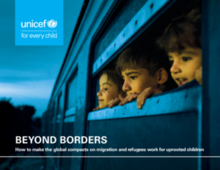Recent large-scale movements of refugees and migrants have drawn attention to the need for global and coordinated action for peaceful, orderly and comprehensive approaches to refugees and migrants. UNICEF has joined the voices of many who have called for policies and programmes that address the care and protection of refugee, migrant and displaced children. This report highlights initiatives underway that work towards achieving this goal – initiatives that can be replicated around the world. The case studies presented are examples of how the UNICEF six-point Agenda for Action can be implemented to provide a safe home, a safe passage and a safe destination for every child.
UNICEF's six-point Agenda for Action includes the following items:
- Protect child refugees and migrants, particularly unaccompanied children, from exploitation and violence
- End the detention of children seeking refugee status or migrating
- Keep families together as the best way to protect children and give children legal status
- Keep all refugee and migrant children learning and give them access to health and other quality services
- Press for action on the underlying causes of largescale movements of refugees and migrants
- Promote measures to combat xenophobia, discrimination and marginalization in countries of transit and destination
This document refers to the Global Compact on Refugees and the Global Compact for Safe, Orderly and Regular Migration and other global actions as a historic opportunity to " drawn attention to the need for global and coordinated action for peaceful, orderly and comprehensive approaches to refugees and migrants. "

